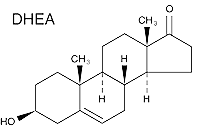DHEA - The Mother of all Hormones

What is DHEA?
DHEA is a natural, intermediate steroid hormone produced in our body by the adrenal glands. DHEA (dehydroepiandrosterone) is called "mother of hormones", or prohormone because DHEA is further converted to generate 50 other essential hormones. For example, DHEA is converted to androgens (male hormones) or estrogens (female hormones) in the cells. DHEA is the most abundant hormone in our blood, and adequate blood DHEA level is critical for many vital hormonal and metabolic functions of our body. Our bodies produce less and less DHEA as we age, and as a result, our blood DHEA level decreases as we get older, generally falling significantly by the age of 30, and by as much as 50% by as 40.
Improved DHEA levels have been correlated with improved sense of well being, reduce body fat and improve skin tone and moisture, increase sex drive, improve immunity, enhance memory, and increase bone density. Numerous studies have proven great correlations between DHEA deficiency or insufficiency and a variety of diseases and symptoms. For example, decreased levels of DHEA predispose human and animals to higher probability of breast cancer, autoimmune diseases, osteoporosis, and Alzheimer's diseases, etc. A study reported in the prestigious journal Science in August 2002 directly correlates increased blood DHEA level to longevity.
Best DHEA Natural Supplements
DHEA dietary supplements have been in use for a variety of reasons: To deter aging, improve sexual function/erectile dysfunction, treat cognitive decline, enhance athletic performance, facilitate weight loss, improve strength, treat osteoporosis, improve immunomodulation for rheumatologic conditions, and treat depression. Over the years, we compiled our list of the best DHEA natural and organic supplements. However, our picks are mostly match the Amazon's best-sellers.

History
DHEA was first isolated from urine by Adolf Butenandt in 1931, who won Nobel prize for this. S-DHEA, the sulfate ester of DHEA, was isolated in 1944. In 1960, Etienne-Emile Baulieu discovered that HDEA is produced from adrenal cortex. During the period of 1972-1991, DHEA was tested for the effectiveness in reducing fat, protecting from cancers, and prevention of atherosclerosis. DHEA began to show up as an OTC supplement in early 1980, and was banned in 1985 by the US Food and Drug Administration for lack of clinical data to support the safety and medical claims made by the vendors. FDA's restrictions on DHEA was lifted and DHEA remerged in the market in 1994 for distribution to public. DHEA has been a hot topic both in commerce and research in the past two decades.
Usage
In general, DHEA dietary supplement is used to achieve the following:
• Anti-Aging
• Enhanced mood, energy, and memory
• Improved immune system
• Boosted sex drive (especially in women)
• Reduced Osteoporosis
• Improved fat loss
• More muscle mass
• Reduced Autoimmune disorders
• Less Heart Disease
Recommended dose has been estimated to be 30-60 mg per day, although optimal dose has not been determined yet. Due to the low efficiency of DHEA absorption through intestines, varying proportions of the orally taken DHEA will not be delivered to bloodstream. On the average, a 20 year old male produces approximately 30 mg of DHEA per day, while an average female produces 20 mg DHEA per day. Unless one takes excessively large amount of DHEA on a regular basis, no side effect is expected. Strange things have been reported to occur, although rarely, at large-dose intake of DHEA: these include increased facial hair, acne, increase perspiration, menstrual irregularity, and adverse influence on prostate, etc.
Freebies & Discount Codes
Find out freebies and coupons for savings on health products available on the Web

















